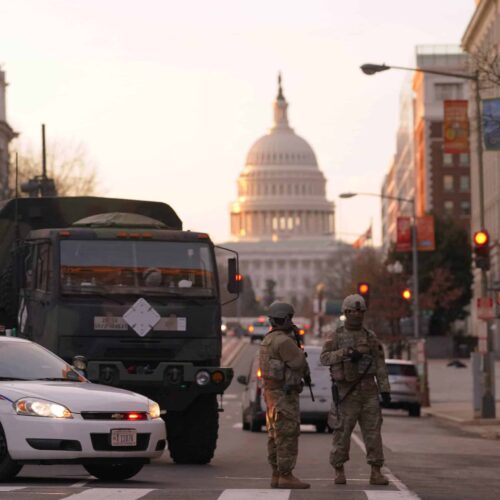Introduction
This is a news analysis from the Center for Public Integrity.
Today’s inauguration, part of the ritual of American democracy, is offset by images usually associated with a coup. Thousands of armed National Guard members are juxtaposed with the monuments and symbols that tell the American story. The Washington Monument. The Lincoln Memorial. And the U.S. Capitol, overrun two weeks ago by a largely white mob of self-styled patriots.
On a day steeped in tradition, a denial and a distortion of American history has brought us to this painful moment of troops, tanks and barricades that have made Washington, D.C., virtually impassable.
Long before former President Donald Trump provoked supporters to storm the Capitol on Jan. 6, Americans had been drinking from his fire hose of alternative facts. Some, like Ashli Babbitt, the military veteran who was killed during the insurrection at the Capitol, got drunk on the lies and hate. Including the biggest lie of all — that the election was stolen, and not just anywhere. The allegations of voter fraud centered on places such as Philadelphia, Atlanta and Detroit, home to large Black populations, fueling the simmering white fears that Trump steadily stoked as a politician.
Trump provided the megaphone for voices that lived in the shadows, a part of the American story we don’t want to tell and that we insist isn’t us. But as historian Eric Foner has said, we witnessed two themes of our national story on Jan. 6: the violence at the Capitol and the election of Georgia’s U.S. senators, the Rev. Raphael Warnock, who is African American, and Jon Ossoff, who is Jewish.
As Trump exits the White House, he’s leaving behind a fabricated history of America that rejects its complicated narrative of progress and peril. In September, Trump created the 1776 Commission in response to The 1619 Project, The New York Times Magazine series on the legacy of slavery. On Monday, the commission released its report, which argues that Americans have been fed a false narrative of their history, including the role of slavery. The introduction to the commission’s report describes its work as “a dispositive rebuttal of reckless ‘re-education’ attempts that seek to reframe American history around the idea that the United States is not an exceptional country but an evil one.”
The report peddles the fiction that “The foundation of our Republic planted the seeds of the death of slavery in America,” even though the institution persisted for almost a century after the nation’s founding. In other passages, the report furthers conspiracy theories that in part drove the insurrection at the U.S. Capitol. A section that criticizes “progressivism” states, “This shadow government never faces elections and today operates largely without checks and balances. The founders always opposed government unaccountable to the people and without constitutional restraint, yet it continues to grow around us.”
President Joe Biden will issue an executive order to dissolve the commission, his transition team said on Wednesday. The head of the American Historical Society has dismissed the commission report as “cynical politics.”
In an interview shortly after Trump announced the commission, Ian Haney López, a leading scholar of critical race theory, said the president was distorting history to win reelection. “Part of the story he’s telling is, ‘hey, this country is fundamentally a white country, was built by whites. It’s led by whites. It evinces the values of whites,’” Haney López said. “‘And yet white culture is right now under threat of being replaced and disrespected and that there’s this new culture that’s arising that in fact denigrates and insults whites and celebrates people of color.’”
America can’t move forward without a common narrative of its past, historian John Hope Franklin, the preeminent scholar of American slavery, said years ago. That means sharing the history the 1776 report would deny. Like the 1921 attack by a white mob on a Black community in Tulsa, Oklahoma, that destroyed a prosperous Black business district in the city and claimed the lives of hundreds of Black people. Or the 1898 coup in Wilmington, North Carolina, that toppled the city’s biracial government.
Foner, who’s known for his groundbreaking work on Reconstruction, says it’s not unprecedented that violent racists have attempted to overthrow democratically elected governments. The events of Jan. 6 weren’t a departure from our history, but a part of it.
The sentiments and violence that brought the tanks and troops to Washington won’t disappear with the transfer of power. Like other nations emerging from deep-seated conflicts, the first step toward reconciliation and accountability is establishing the truth and creating a common public record.
Today, the U.S. Capitol has been reclaimed for the inauguration of Joe Biden and Kamala Harris, a hopeful scene compared with the despairing images of two weeks ago. But until all Americans accept a common narrative of our past, we can never be united.
Susan Smith Richardson is CEO of the Center for Public Integrity, a nonprofit nonpartisan newsroom that reports on race, power and privilege.
Read more in Money and Democracy
Money and Democracy
Texas abortion law reflects GOP turn towards citizen enforcement
Republican support for civil liability has ‘exploded,’ and some experts warn it threatens rights.
Money and Democracy
Redistricting will always be contentious. Ask Arizona.
The state tried to take the partisanship out of its political maps. The partisans aren’t having it.




Join the conversation
Show Comments